
GastoniaCommerson ex Lamarck is a formerly accepted genus of plants in the ivy and ginseng family, Araliaceae. It had been known as an unnatural group, but was recognized as late as 2010, when its nine species were distributed to four different subgenera of the large genus Polyscias. Because the genus Gastonia is now obsolete, its species are herein referred to by their names in Polyscias.

The Tableau encyclopédique et méthodique des trois regnes de la nature was an illustrated encyclopedia of plants, animals and minerals, notable for including the first scientific descriptions of many species, and for its attractive engravings. It was published in Paris by Charles Joseph Panckoucke, from 1788 on. Although its several volumes can be considered a part of the greater Encyclopédie méthodique, they were titled and issued separately.
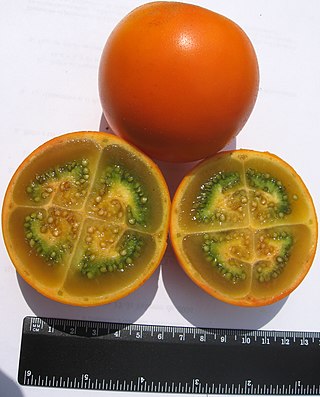
Solanum quitoense, known as naranjilla in Ecuador, Costa Rica, and Panama and as lulo in Colombia, is a tropical perennial plant from northwestern South America. The specific name for this species of nightshade means "from Quito."
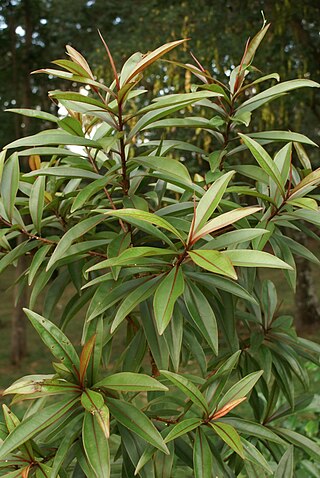
Foetidia is a genus of flowering plants first described as a genus in 1788.
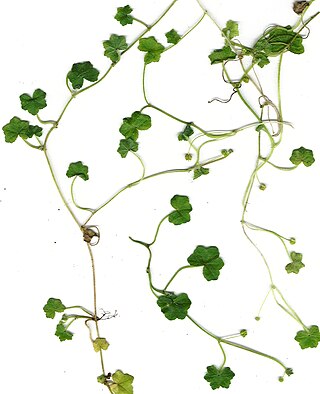
Hydrocotyle, also called floating pennywort, water pennywort, Indian pennywort, dollar weed, marsh penny, thick-leaved pennywort and white rot, is a genus of prostrate, perennial aquatic or semi-aquatic plants formerly classified in the family Apiaceae, now in the family Araliaceae.

Abronia umbellata is a flowering annual plant which is native to western North America. Other common names include beach sand verbena and purple sand verbena.

Jean Louis Marie Poiret was a French clergyman, botanist, and explorer.

Distephanus is a genus of flowering plants in the family Asteraceae. It is described by American botanist Harold E. Robinson as having over 40 species and by David Mabberley as having only 34 species. These sources differ sharply in their description of the range of the genus. Robinson has it ranging throughout Africa and occurring also in India and China. Mabberley has it restricted to southeast Africa, Madagascar, and Mauritius. Plants of the World Online accepts 44 species native to sub-Saharan Africa, Madagascar, and south-central China.
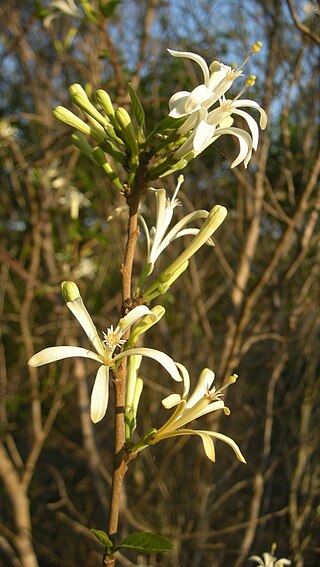
Turraea is a genus of plants in the family Meliaceae, native to the Old World tropics and subtropics.

Hispidella is a genus of flowering plants in the family Asteraceae. The genus is monotypic with only one known species, Hispidella hispanica, native to the Iberian Peninsula.
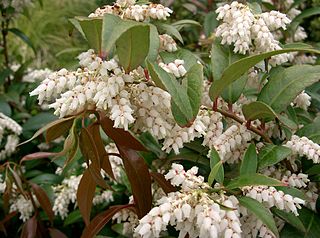
Leucothoe axillaris is a shrub native to the southeastern United States, with the common names swamp dog-laurel and coastal dog-hobble. It has been reported from Louisiana, Mississippi, Alabama, Florida, Georgia, North and South Carolina and Virginia. It grows on floodplains in coastal areas at elevations of less than 200 m (660 ft).

Chromolaena sinuata, the wavyleaf thoroughwort, is a Caribbean species of flowering shrub in the family Asteraceae. It is found on the Islands of Cuba, Hispaniola, Puerto Rico, Guadeloupe, Martinique, La Desirade, Montserrat, St. Eustatius, and Antigua.

Cordia lutea, known as yellow cordia or in Spanish muyuyo, is a shrubby plant in the borage family (Boraginaceae), native to the Galápagos Islands, mainland Ecuador, Peru, and the Marquesas Islands in Polynesia. Common in the arid lowlands of the Galápagos, its relatively large yellow flowers make it easy to identify.

Nuxia congesta, commonly known as brittle-wood, is a species of tree in the Stilbaceae family, with an extensive range in the Afrotropics. The species is named congesta for its dense inflorescences.

Dianthus libanotis, the Mount Libanus pink or Lebanon pink, is a herbaceous perennial plant of the family Caryophyllaceae.
Aristida capillacea is a species of plant in the grass family (Poaceae). It is found in South America.

Tetraria bromoides is a species of flowering plant in the sedge family, which is native to the Cape Provinces in Southern Africa.

Sapindoideae is a subfamily of flowering plants in the soapberry family, Sapindaceae. It includes a number of fruit trees, including lychees, longans, rambutans, and quenepas.
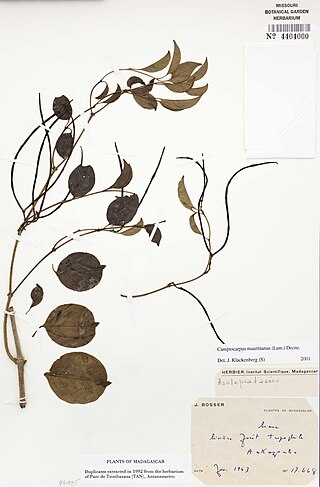
Camptocarpus mauritianus is a species of plant in the Apocynaceae family. It is native to Comoros, Madagascar and Réunion. Jean-Baptiste Lamarck, the naturalist who first formally described the species named it, using the synonym Cynanchum mauritianum, after the region of the Indian Ocean that includes the island of Mauritius, although the type specimen he examined did not list a specific location.


















